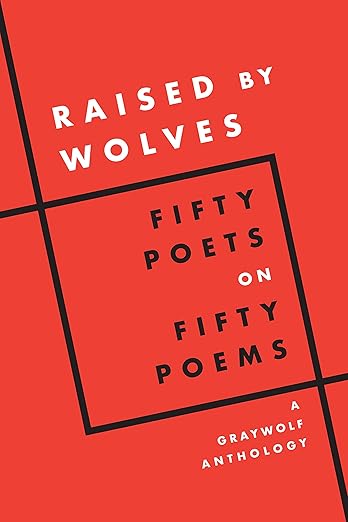Raised by Wolves: Fifty Poets on Fifty Poems
Raised by Wolves: Fifty Poets on Fifty Poems.
Edited and published by Graywolf Press,
2024, paper, 136 pages, $18,
ISBN# 978-1-64445-266-0
In How to Read a Poem, Edward Hirsch describes the lyric poem as an unsettling, intense discourse between strangers. This discursive action animates the pages of Raised by Wolves: Fifty Poets on Fifty Poems, a new anthology from Graywolf Press. Celebrating the press’s half century of poetry publishing, fifty Graywolf poets each selected a poem from the press archives and also contributed a short essay. Gaining insight into one poet’s words by way of another, these essays artfully create a communal mosaic illustrating not only the many tessera of Graywolf’s aesthetics and ethos, but also the lively dialogue at the heart of the poetic endeavor.
Mesmerizers of time, place, feeling, mood—poetry can encode messy immensities, folding worlds within words like accordion bellows. Hirsch describes poems as having “stored magic.” Many essays in Raised by Wolves reckon with this magical energy. Where does it reside in the poem? What does it evoke, how does it move through?
For example, Saskia Hamilton’s poem “Faring” creates a meandering cityscape, noting and noticing many scenes – from children playing in the neighborhood, to waves of post-pill nausea, meteorology’s changing moods, musings of an 18th century poet, and more: “In the streets below, each passersby carries time internally, it opens the mind like a flower blown in its native bed.” Claudia Rankine writes that Hamilton’s poem “builds its rooms against the ‘toomuchness’ of life, life’s actual, red-hot intensities.” Language and experience are co-constituted through poetic practice, giving expression to the difficult and often incalculable.
Ilya Kaminsky reflects on how Vénus Khoury-Ghata’s figurative language in “She Says,” where she builds new myths in the wreckage of war, “feels like a beautiful construction that might otherwise need to be expressed by a scream.”
Language is often the tool of oppression, Monica Youn reflects. But in reading Mullen’s poetry, Youn sees language used to “undermine, excavate, perforate, dislodge, renovate—hollowing out breathing space, elbow room, fashioning a home within an often inhospitable tradition,” as in Mullen’s “Trimmings”: “Mistress in undress, filmy peignoir. Feme sole in camisole. Bit part, petite cliché.[…] Negligent in ladies’ lingerie, a dressy dressing down.”
Layli Long Solider writes about power and agency in poetry, particularly for marginalized poets around issues such as disclosure, exposure, and vulnerability. Long Solider includes a handful of lines from Solmaz Sharif’s poem “Personal Effects,” where, following a blank space on the page, Sharif describes a photo and the young casualty of war it depicts. Long Solider writes, what is left off the page “may vibrate at a higher frequency than what’s on the page. These choices are the poet’s agency—or better yet, a form of sovereignty. Withholding is a way of saying, you cannot see this, know this, or take this; it’s an assertion of immeasurable integrity.”
In “The Forest,” Susan Stewart writes: “You should lie down now and remember the forest, / for it is disappearing— / no, the truth is it is gone now / and so what details you can bring back / might have a kind of life. // Not the one you had hoped for, but a life.” Jennifer Gratz writes that this poem “has haunted me now for nearly thirty years.” Stewart was inspired to write “The Forest” after hearing that a time may come when no one will remember the experience of a forest. “A chilling thought,” Gratz writes, “one we all live with still.”
Folding time, sharing experiences, holding attention – the poem’s magic is surfacing. The poem “reads as incantation, as spell, revering the forest by recreating its wildness in its own form,” Gratz reflects, later describing how it “weaves a mesmerizing reading experience of simultaneous familiarity and disorientation, of being ‘tangled’ and, in the end, ‘lost’ in the forest—and lost in the forest of the poem, too.”
What magic indeed, drawn in through discourse, ensnared in shared moments amongst strangers.
–C.T. Wolf


